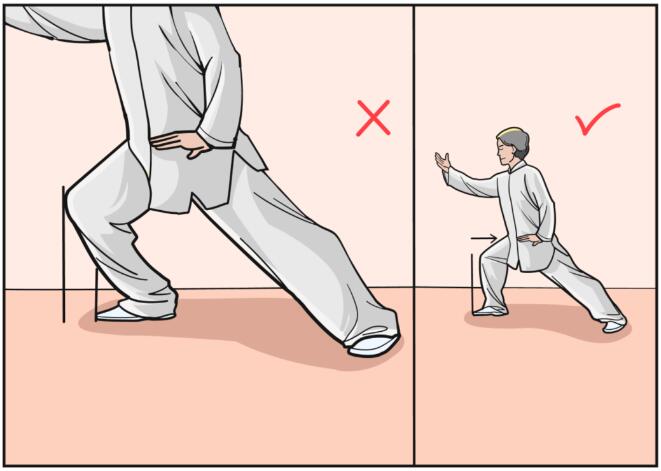
Although Tai Chi is a form of martial arts that is beneficial to the body and mind, improper practice may also lead to some disadvantages.
Common disadvantages of tai chi and prevention methods:
1, Improper practice may lead to physical injury: Although Tai Chi moves slowly, there are also some movements that require explosive power. If practiced improperly, it may cause physical injuries such as muscle strain and joint sprain.
2, Not suitable for all people: Since Tai Chi requires a certain degree of physical flexibility and sense of balance, it may not be suitable for some people with poor physical conditions, older age or certain diseases.
3, Excessive practice may lead to physical fatigue: Although the intensity of Tai Chi practice is relatively low, if it is practiced excessively, it may cause physical fatigue and affect daily life and work.
The practice of Tai Chi can harmonize qi and blood, enhance the function of internal organs, and improve physical flexibility. However, if practiced improperly, it may lead to physical injury, and it is not suitable for all people.
When practicing Tai Chi, we should arrange the practice time and intensity reasonably according to our physical condition and actual situation, avoid excessive practice, and also pay attention to the correctness of the practice method to avoid physical injury.
The following are the disadvantages of Tai Chi that often occur during practice in various parts of the body for reference and avoidance by practitioners at all stages.
Physical Injury
Reason: Although Tai Chi moves slowly, some movements such as turning and jumping require strong explosive power. Improper practice may lead to muscle strain, joint sprain, etc.
Prevention and Treatment: When practicing, you should ensure that the movements are accurate and avoid excessive weight, especially when turning and jumping.
Not suitable for everyone
Reason: Tai Chi requires a certain degree of body flexibility and sense of balance. It may not be suitable for people with poor physical conditions, older age or certain diseases.
Prevention and Treatment: You should choose whether to practice Tai Chi according to your personal physical condition. If necessary, you can consult a doctor or coach.
Over-practice
Reason: The intensity of Tai Chi practice is relatively low, but excessive practice may cause physical fatigue and affect daily life and work.
Prevention and Treatment: Reasonably arrange the practice time and intensity, avoid excessive practice, and ensure that practice is balanced with daily life.
Knee Problems
Reason: Tai Chi movements are mostly centered on the knee joint. Improper posture or excessive practice will cause great pressure on the knee joint.
Prevention and treatment: Maintain the correct posture and avoid excessive weight-bearing movements. Consult professionals if necessary.
Waist pain
Cause: The twisting waist movement commonly used in Tai Chi can promote blood circulation, but if the movement is incorrect or excessive twisting, it will cause waist pain.
Prevention and treatment: Avoid practicing movements that exceed your own limits for a long time and ensure that the movements are accurate.
Index finger
Cause: Some Tai Chi movements require fisting. The correct way of fisting will put pressure on the muscles. If the posture is incorrect, the index finger will be accidentally indexed, resulting in finger injury.
Prevention and treatment: Pay attention to the force point, fisting method, etc., to ensure accurate movements.
Dizziness
Cause: Tai Chi posture changes stimulate the movement of prostate fluid and otoliths. Long-term practice can improve vertigo. However, if you stand up suddenly or change position quickly, you may experience discomfort such as dizziness.
Prevention and treatment: Stand up slowly, keep a steady posture, and avoid sudden changes in position.
Wrist pain
Cause: Extreme bending of the wrist or using the wrist and arm to move in an uncoordinated manner will cause discomfort and adverse consequences to the wrist.
Prevention and treatment: Avoid exerting too much force, use the strength of the body reasonably, and ensure the coordination of the wrist and arm.
Panting
Reason: Tai Chi is a kind of exercise to regulate breathing, but excessive breathing exercise will increase the burden on the chest.
Prevention and treatment: Pay attention to breathing coordination, avoid breathing too quickly, and ensure even breathing.
Headache and dizziness
Reason: Tai Chi exercise requires attention to the stability of the head, so that the head is in a straight position, not up or down, so as not to vibrate too much and cause abnormal sensations in the body.
Prevention and treatment: Keep the head stable, avoid unnecessary vibrations, and ensure smooth movements.
Through the above measures, the disadvantages of Tai Chi practice can be effectively reduced and the practice effect can be improved.
